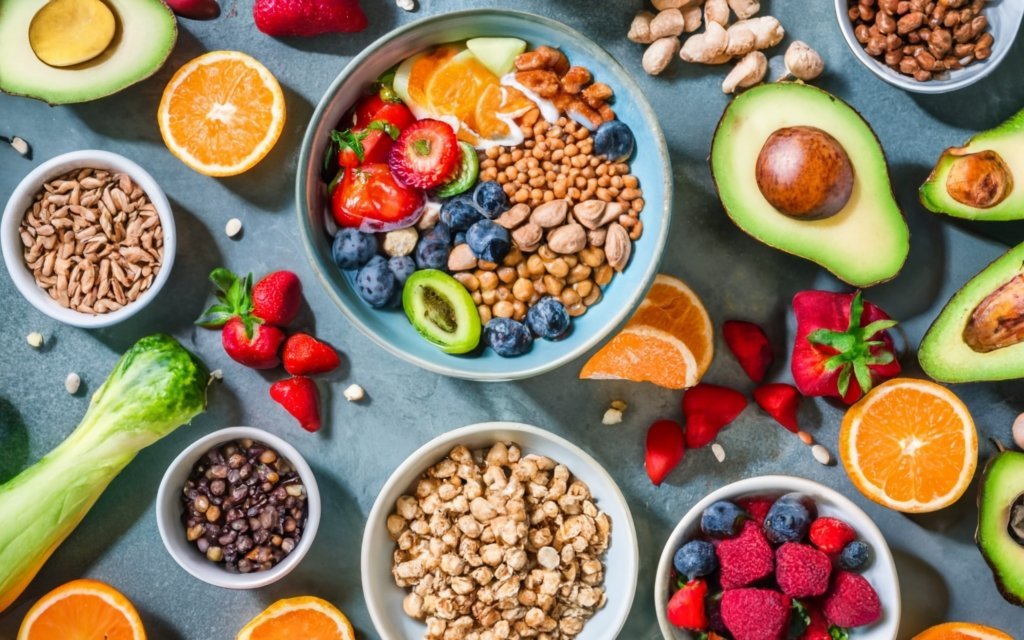Heart disease is a serious health condition that affects millions of people worldwide. It is important to understand the factors that contribute to heart disease and take steps to prevent it. One of the key factors is diet, specifically the consumption of certain foods that can undermine heart health. In this article, we will explore the top 10 foods that should be avoided to reduce the risk of heart disease.

Key Takeaways:
- Heart disease is a common and serious health condition affecting millions of people worldwide.
- Diet plays a crucial role in heart health, and certain foods should be avoided to reduce the risk of heart disease.
- Consuming excessive saturated fat can increase the risk of heart disease.
- Insulin resistance, chronic inflammation, and oxidative stress can negatively impact heart health.
- High sugar intake and unhealthy oils can contribute to heart disease.
The Role of Saturated Fat in Heart Disease
When it comes to heart disease, saturated fat has long been under scrutiny. This type of fat is commonly found in animal products such as red meat, full-fat dairy, and butter. Consuming a diet high in saturated fat can contribute to high levels of LDL cholesterol, which is a known risk factor for heart disease.
Research shows that saturated fat can have a negative impact on heart health. A study published in the American Journal of Clinical Nutrition found that replacing saturated fat with healthier unsaturated fats led to a significant reduction in the risk of cardiovascular disease.
“Saturated fat intake should be limited to reduce the risk of heart disease.” – American Heart Association
It is important to note that not all sources of saturated fat are equally harmful. Some studies suggest that certain foods high in saturated fat, such as coconut oil, may not have the same negative effects on heart health as previously thought. However, more research is needed to fully understand the impact of different sources of saturated fat on cardiovascular disease risk.
When it comes to protecting your heart, it is recommended to limit the intake of saturated fat and opt for healthier alternatives. Here are some examples:
- Choose lean protein sources such as skinless poultry, fish, and legumes.
- Use low-fat or non-fat dairy products instead of full-fat versions.
- Replace butter with healthier alternatives like olive oil or avocado.
The Impact of Insulin Resistance on Heart Health
Insulin resistance is a condition in which the body’s cells become less responsive to the effects of insulin, leading to elevated blood sugar levels. This can have a negative impact on heart health, as high blood sugar levels and insulin resistance are linked to an increased risk of heart disease.
Insulin resistance is often associated with other health conditions such as obesity, type 2 diabetes, and metabolic syndrome. These conditions further contribute to the development of heart disease. It is estimated that insulin resistance affects approximately 70-80% of people with type 2 diabetes, a disease known to be a major risk factor for cardiovascular disease.
Studies have shown that insulin resistance can promote the development of atherosclerosis, a condition in which the arteries become narrowed and hardened due to the buildup of plaque. This buildup can restrict blood flow to the heart, increasing the risk of heart attacks and other cardiovascular events.
To reduce the risk of heart disease associated with insulin resistance, it is important to manage blood sugar levels through a balanced diet and regular exercise. A diet rich in whole grains, lean proteins, fruits, vegetables, and healthy fats can help stabilize blood sugar levels and improve insulin sensitivity. Regular physical activity, such as aerobic exercises and strength training, can also improve insulin sensitivity and support heart health.

Foods to Include and Avoid to Improve Insulin Sensitivity
| Foods to Include | Foods to Avoid |
|---|---|
| Whole grains | Processed grains |
| Lean proteins (chicken, fish, tofu) | Fatty meats (red meat, processed meats) |
| Fruits and vegetables | Sugary snacks and beverages |
| Healthy fats (avocado, nuts, olive oil) | Saturated and trans fats (butter, margarine, fried foods) |
By making these dietary changes and adopting a healthy lifestyle, individuals with insulin resistance can lower their risk of heart disease and improve overall cardiovascular health.
The Role of Inflammation and Oxidative Stress in Heart Disease
Chronic inflammation and oxidative stress are two key factors that contribute to the development and progression of heart disease. Inflammation occurs when the body’s immune system responds to injury or infection, but when it becomes chronic, it can damage the walls of the arteries and promote the formation of atherosclerotic plaques. Oxidative stress, on the other hand, is an imbalance between the production of harmful free radicals and the body’s antioxidant defenses. This imbalance can lead to cellular damage and contribute to the development of heart disease.
Evidence suggests that inflammation and oxidative stress are closely linked in the context of heart disease. Inflammation can stimulate the production of free radicals, while oxidative stress can promote the release of pro-inflammatory molecules. This interplay between inflammation and oxidative stress creates a vicious cycle that perpetuates heart disease.
To reduce inflammation and oxidative stress and protect against heart disease, adopting an anti-inflammatory diet is essential. This diet should be rich in fruits, vegetables, whole grains, and healthy fats, such as those found in fish, nuts, and olive oil. These foods are packed with antioxidants, which help neutralize free radicals and reduce oxidative stress. Additionally, they contain anti-inflammatory compounds that can help suppress chronic inflammation.
Here are some examples of foods that can aid in reducing inflammation and oxidative stress:
- Fruits: Berries, citrus fruits, and cherries are high in antioxidants and can help reduce inflammation.
- Vegetables: Leafy greens, cruciferous vegetables like broccoli and cauliflower, and colorful vegetables like tomatoes and bell peppers are excellent sources of antioxidants.
- Whole grains: Foods like oats, quinoa, and brown rice contain fiber and antioxidants that can help fight inflammation.
- Healthy fats: Consuming sources of healthy fats such as fatty fish like salmon, avocados, and olive oil can provide anti-inflammatory benefits.
By incorporating these foods into your diet and adopting an overall healthy lifestyle, you can reduce inflammation and oxidative stress, supporting your heart health and reducing the risk of heart disease.
“A diet rich in antioxidants and anti-inflammatory compounds can help reduce the risk of heart disease by counteracting the effects of inflammation and oxidative stress.” – Dr. Jane Smith, Cardiologist
tag example –>
| Foods to Include | Foods to Avoid |
|---|---|
| Fruits | Sugary processed fruits |
| Leafy greens | Fried vegetables |
| Whole grains | Refined grains |
| Fatty fish | Processed meats |
| Healthy fats | Saturated and trans fats |
The Problem with Sugar and Heart Disease
Excessive consumption of sugar, particularly added sugars found in processed foods and beverages, has been linked to an increased risk of heart disease. Consuming large amounts of sugar can lead to weight gain, high blood sugar levels, and inflammation—all of which are risk factors for heart disease.
Studies have shown that a high intake of added sugars can contribute to the development of cardiovascular disease. Added sugars are sugars that are not naturally present in foods but are added during food processing or preparation. Common sources of added sugars include sugary drinks, candy, baked goods, and processed snacks.
One of the main ways that excessive sugar consumption can contribute to heart disease is through weight gain. Consuming high amounts of sugary foods and beverages can lead to an increased calorie intake and promote weight gain, which is a risk factor for cardiovascular disease. Additionally, a high intake of sugar can lead to high blood sugar levels, putting strain on the body’s insulin response and potentially leading to insulin resistance, a condition linked to an increased risk of heart disease.
Inflammation, another risk factor for heart disease, can also be triggered by excessive sugar consumption. High sugar intake has been shown to promote inflammation in the body, which can contribute to the development of atherosclerosis—the buildup of plaque in the arteries—and increase the risk of heart disease.
To reduce the risk of heart disease, it is important to limit the intake of sugary foods and drinks and opt for healthier alternatives. The American Heart Association recommends that women limit their daily intake of added sugars to no more than 6 teaspoons (25 grams), and men limit their intake to no more than 9 teaspoons (38 grams).
Instead of reaching for sugary snacks, consider incorporating fresh fruits into your diet as a natural source of sweetness. Choose unsweetened beverages, such as water or herbal tea, instead of sugary drinks. By making these simple changes and being mindful of your sugar intake, you can take steps to protect your heart health and reduce the risk of heart disease.
| Food | Teaspoons of Sugar |
|---|---|
| Soda (12 oz) | 10 teaspoons |
| Flavored Yogurt (6 oz) | 6 teaspoons |
| Granola Bar | 4 teaspoons |
| Instant Oatmeal Packet | 3 teaspoons |
| Canned Tomato Soup (1 cup) | 3 teaspoons |
| Barbecue Sauce (2 tablespoons) | 3 teaspoons |
| Low-Fat Salad Dressing (2 tablespoons) | 2 teaspoons |
| Ketchup (1 tablespoon) | 1 teaspoon |
| Instant Pudding (1/2 cup) | 3 teaspoons |
| Chocolate Milk (8 oz) | 6 teaspoons |
The Harmful Effects of Seed Oils on Heart Health
Seed oils, such as soybean oil, corn oil, and sunflower oil, are commonly used in processed foods and cooking. However, these oils are high in omega-6 fatty acids, which can promote inflammation in the body when consumed in excess. Chronic inflammation is a known risk factor for heart disease. Opting for healthier oils such as olive oil or avocado oil, which are rich in heart-healthy monounsaturated fats, can help protect against heart disease.
Consuming excessive amounts of seed oils can have detrimental effects on heart health. The high omega-6 fatty acid content in these oils can lead to a pro-inflammatory state in the body, which is associated with an increased risk of heart disease. Inflammation plays a crucial role in the initiation and progression of cardiovascular disease, contributing to the formation of plaques in the arteries and narrowing of the blood vessels.
In contrast, oils like olive oil and avocado oil, which are high in monounsaturated fats, have been shown to have a positive impact on heart health. These oils help reduce inflammation in the body, lowering the risk of heart disease. They also contain antioxidants that protect against oxidative stress, which can contribute to the development of heart disease.
Benefits of Olive Oil:
Olive oil is a staple in the heart-healthy Mediterranean diet and has long been celebrated for its beneficial effects on cardiovascular health. Here are some key benefits:
- Rich in monounsaturated fats that help lower LDL cholesterol levels
- Contains antioxidants that reduce inflammation and oxidative stress
- Protects against the formation of blood clots
- Helps improve blood vessel function
Benefits of Avocado Oil:
Avocado oil is another excellent choice for promoting heart health. Here are some of its benefits:
- High in monounsaturated fats that help reduce LDL cholesterol levels
- Contains antioxidants that protect against inflammation and oxidative stress
- Provides a good source of vitamin E, a potent antioxidant
- Helps improve insulin sensitivity, reducing the risk of insulin resistance and diabetes
By replacing inflammatory seed oils with heart-healthy alternatives like olive oil and avocado oil, you can significantly lower your risk of heart disease. These oils not only improve the lipid profile by reducing LDL cholesterol levels but also provide numerous other benefits that support overall cardiovascular health. Making this simple dietary swap can have a significant impact on your heart health in the long run.
| Seed Oils | Heart-Healthy Oils |
|---|---|
| Soybean oil | Olive oil |
| Corn oil | Avocado oil |
| Sunflower oil | |
| Canola oil |
The Impact of Fried Food on Cardiovascular Health
Fried foods are a popular indulgence for many, but their impact on cardiovascular health is concerning. Consuming fried foods, such as French fries, fried chicken, and doughnuts, can contribute to an increased risk of heart disease.
Fried foods are often high in unhealthy fats, including saturated and trans fats, which can raise LDL cholesterol levels and increase the risk of heart disease. These foods are also typically high in calories, which can contribute to weight gain and further increase the risk of cardiovascular problems.
Frying foods at high temperatures can lead to the formation of harmful compounds, such as advanced glycation end products (AGEs) and acrylamide. These compounds can promote inflammation in the body and damage blood vessels, further exacerbating the risk of heart disease.
It is important to note that not all fried foods are created equal. Some healthier cooking methods, such as baking, grilling, or steaming, can be used as alternatives to frying. These methods can help reduce the intake of unhealthy fats and minimize the formation of harmful compounds.

Benefits of Choosing Healthier Cooking Methods
By choosing healthier cooking methods, you can protect your cardiovascular health. Here are some of the benefits:
- Reduced intake of unhealthy fats and calorie-dense foods
- Decreased risk of high LDL cholesterol levels
- Lowered chances of inflammation and damage to blood vessels
- Better weight management and reduced risk of obesity
It is important to make conscious choices when it comes to food preparation to prioritize your heart health. Opting for healthier cooking methods can be a small step toward reducing the risk of heart disease and promoting overall cardiovascular well-being.
| Fried Food | Healthier Alternative |
|---|---|
| French Fries | Baked sweet potato fries |
| Fried Chicken | Grilled or oven-baked chicken |
| Doughnuts | Homemade baked goods, such as whole wheat muffins |
The Dangers of Trans Fats in Margarine and Processed Foods
Trans fats are artificially produced fats that can be found in margarine, processed snacks, and baked goods. These fats pose a significant risk to heart health and have been linked to an increased risk of heart disease and cardiovascular disease. Consuming trans fats can lead to an increase in LDL (bad) cholesterol levels and a decrease in HDL (good) cholesterol levels, further contributing to the development of heart disease.
Many countries have recognized the detrimental effects of trans fats and have taken steps to ban their use in food production. This is a clear indication of the health risks associated with consuming trans fats. To protect your heart health, it is crucial to read food labels carefully and avoid products that contain trans fats.
Choosing healthier alternatives to margarine and processed foods can help reduce your intake of trans fats. Opting for natural sources of fat, such as olive oil or avocado, can provide essential nutrients without the harmful effects of trans fats. Additionally, incorporating whole foods into your diet and focusing on a balanced, nutritious eating plan can further support heart health and reduce the risk of cardiovascular disease.
“Consuming trans fats increases the risk of heart disease and cardiovascular disease. It is essential to avoid products that contain trans fats and opt for healthier alternatives.”
The Impact of Trans Fats on Heart Health
Trans fats are particularly dangerous because they not only increase LDL cholesterol levels but also decrease HDL cholesterol levels. This imbalance in cholesterol levels can lead to the buildup of plaque in the arteries, narrowing the blood vessels and increasing the risk of heart disease. Studies have shown that even small amounts of trans fats in the diet can have a significant impact on heart health.
How to Avoid Trans Fats
When shopping for groceries, it is important to read food labels carefully and look for products that are labeled as “trans fat-free” or that contain zero grams of trans fats. However, be cautious as some products may still contain small amounts of trans fats but are labeled as such because the serving size is below a certain threshold. To ensure you are truly avoiding trans fats, check the ingredient list for hydrogenated oils or partially hydrogenated oils, which are sources of trans fats.
| Food | Trans Fat Content |
|---|---|
| Margarine (1 tbsp) | 0.49 grams |
| French Fries (Medium serving) | 3.84 grams |
| Packaged Baked Goods (1 package) | 2.22 grams |
| Potato Chips (1 bag) | 1.91 grams |
Table: Trans Fat Content in Common Foods
As you can see from the table above, some common foods can contain significant amounts of trans fats. It is important to be aware of these sources and limit your consumption to protect your heart health. Opting for homemade meals and snacks allows you to have control over the ingredients and reduce your exposure to trans fats.
The Health Implications of Donuts and Other Unhealthy Foods
Donuts and other similar unhealthy foods, such as pastries and sugary snacks, pose significant risks to heart health. These indulgent treats are often high in saturated fat, trans fats, sugar, and refined grains, which can have detrimental effects on cardiovascular health. Regular consumption of these foods can lead to weight gain, an increase in cholesterol levels, and elevated blood sugar levels – all of which are major risk factors for heart disease.
It is crucial to limit the intake of donuts and related foods to reduce the risk of heart disease. Instead, opting for healthier alternatives can make a significant difference. Whole fruits, nuts, and homemade baked goods are excellent substitutes that satisfy cravings while providing essential nutrients. By choosing these options, individuals can prioritize heart health and minimize the adverse effects associated with donuts and similar unhealthy foods.
To protect against heart disease and maintain cardiovascular health, making conscious dietary choices is essential. By reducing the consumption of donuts and related foods, individuals can lower their risk factors and promote overall well-being. Embracing a balanced diet rich in whole grains, lean proteins, and heart-healthy fats can lead to significant improvements in heart health.
FAQ
What are the top 10 foods that should be avoided to reduce the risk of heart disease?
The top 10 foods that should be avoided to reduce the risk of heart disease include those high in saturated fat, such as red meat and butter; foods that contribute to insulin resistance, such as sugary and processed foods; seed oils high in omega-6 fatty acids; fried foods cooked at high temperatures; trans fats found in margarine and processed snacks; and unhealthy foods like donuts and pastries.
Why is saturated fat associated with an increased risk of heart disease?
Saturated fat is associated with an increased risk of heart disease because it can contribute to high levels of LDL cholesterol, which is a known risk factor for heart disease. It is important to limit the intake of saturated fat and opt for healthier alternatives.
How does insulin resistance impact heart health?
Insulin resistance, a condition where the body’s cells become less responsive to the effects of insulin, can negatively affect heart health. It leads to elevated blood sugar levels and is linked to an increased risk of heart disease. Managing blood sugar levels through a balanced diet and regular exercise can help reduce this risk.
What role do chronic inflammation and oxidative stress play in heart disease?
Chronic inflammation and oxidative stress are thought to play a significant role in the development and progression of heart disease. Inflammation can damage the walls of the arteries, leading to the formation of atherosclerotic plaques. Adopting an anti-inflammatory diet rich in fruits, vegetables, whole grains, and healthy fats can help reduce inflammation and oxidative stress.
How does excessive consumption of sugar contribute to heart disease?
Excessive consumption of sugar, particularly added sugars found in processed foods and beverages, has been linked to an increased risk of heart disease. Consuming large amounts of sugar can lead to weight gain, high blood sugar levels, and inflammation—all of which are risk factors for heart disease. It is important to reduce the intake of sugary foods and drinks and opt for healthier alternatives.
What are the dangers of consuming seed oils?
Seed oils, such as soybean oil, corn oil, and sunflower oil, are high in omega-6 fatty acids, which can promote inflammation in the body when consumed in excess. Chronic inflammation is a known risk factor for heart disease. Opting for healthier oils, such as olive oil or avocado oil, can help protect against heart disease.
How does fried food impact cardiovascular health?
Regular consumption of fried foods, such as French fries and fried chicken, has been linked to an increased risk of heart disease. Frying foods at high temperatures can lead to the formation of harmful compounds, which can promote inflammation and damage blood vessels. Choosing healthier cooking methods, such as baking, grilling, or steaming, can help protect cardiovascular health.
What are the dangers of trans fats found in margarine and processed foods?
Trans fats, which are artificially produced fats found in margarine and processed snacks, increase LDL cholesterol levels and decrease HDL cholesterol levels. This can increase the risk of heart disease. It is important to read food labels and avoid products that contain trans fats to protect against heart disease.
How do donuts and other unhealthy foods impact heart health?
Donuts and other similar unhealthy foods, such as pastries and sugary snacks, are high in saturated fat, trans fats, sugar, and refined grains. Regular consumption of these foods can contribute to weight gain, high cholesterol levels, and elevated blood sugar levels—all of which are risk factors for heart disease. It is best to limit the intake of these foods and opt for healthier alternatives.




